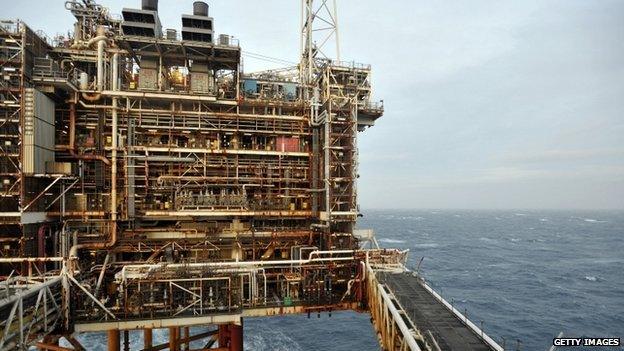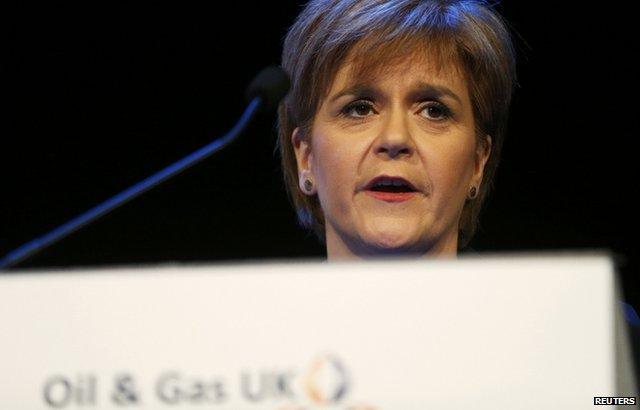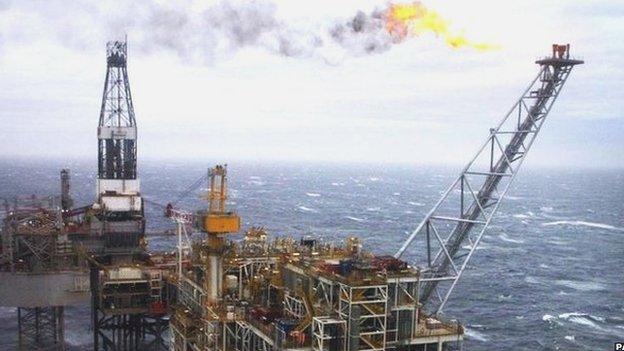Oil and gas chief says sector needs to adjust to $60 a barrel future
- Published

Since the conference met in 2014, the oil price has dropped from about $115 per barrel to $63.
The new boss of the UK's oil and gas body has warned that the sector faces a future in which long term oil prices are about $60 a barrel.
Deirdre Michie told a gathering in Aberdeen that the industry needed to adjust and find a fresh way forward.
Oil prices have fallen from about $115 a barrel to $63 since last June.
The annual oil and gas industry conference also heard from First Minister Nicola Sturgeon, who wants no new tax rises for the sector.
It is the first gathering since the slowdown in the sector.
Thousands of job losses have been announced in the industry in recent months, and thousands more are expected, despite measures announced in the last Budget designed to help the industry. A recent survey found contractors' confidence was at a "record low".
North Sea exploration reached its lowest level in at least two decades in 2014, with 14 explorations wells drilled compared with 44 in 2008.
Ms Michie said: "We have paid more to the Treasury than most other industrial sectors, we generate hundreds of thousands of skilled jobs, we have a vibrant supply chain, at home and abroad, and make a key contribution to the UK's security of energy supply. It is an industry that has grown and evolved for 50 years.
"However, we now face real and present threats that are challenging our future. At $60 oil, 10% of our production is struggling to make money and there is a shortage of capital and a shortage of investors willing to place their money here.
"Therefore it is not unreasonable for the North Sea to set out its stall at being sustainable in a $60 world. As a target, it's one that we as a trade association can champion, government can align with and the regulator can pursue as an enabler, for example, to focus on key infrastructure."
'Not a time for conflict'
She added that focusing on efficiencies would be a key factor for the industry's future.
Ms Michie also believed it was vital for clients, employers, employees, unions, trade associations and governments to work together.
She said: "This is not a time for conflict or entrenched positions.
"We don't need to wait for consensus, but we do need leadership in this industry to drive co-operation and an 'early adopter' culture from companies willing to rise to the challenge."

Analysis by Douglas Fraser, BBC Scotland business and economy editor
When Oil and Gas UK, the trade body, convened this conference last year, the oil price was about to start its slide from $115 per barrel. By January, it hit $45. It's now in the mid-60s, with conflicting signs of its future direction of travel.
Few think it will rise much above $70, because that's the point at which fracking starts again in North America, pushing up supply. Fracking is much more responsive to price than offshore producers can afford to be.
That plunge in the value of this asset has focused attention on the problem of the high cost of operating in British waters. Along with some North American reserves of oil and gas, this is seen in a global context as among the most expensive places to operate.
Costs per barrel have been rising very steeply; partly because fewer barrels are flowing from older, smaller and hard-to-reach reserves: as old equipment needs more and longer shutdowns for maintenance: and partly because the industry had become inefficient through recent years of booming investment.
Much of the talk in Aberdeen this week will be about driving those costs down further, including the tax bill. Frustration about tax, along with regulation, was found to have soared in a recent survey of industry concerns in north-east Scotland.
However, the industry's requests for reduced tax were largely answered in George Osborne's March Budget. The unfinished business is on incentives for exploration, which has been particularly weak of late, and eventually removing Petroleum Revenue Tax altogether.

The Scottish government previously said changes to the industry brought by the chancellor in his recent Budget had not gone far enough to support the oil and gas industry, with particular mention of exploration credit.
Ms Sturgeon reiterated these calls when she opened the conference.
She said: "At this time in the previous parliament nobody in the industry had any inkling that the UK government might decide to increase the supplementary charge from 20% to 32%. Indeed, even on the morning of the announcement, nobody expected it.
"The Scottish government argued strongly for reversing that increase - and also for replacing the current system of field allowances with one unified investment allowance. We are pleased that the UK government has introduced both measures.
"But it now needs to go further.
"The UK government should make a commitment that there will be no tax increases for the industry for the whole of this UK Parliament.
"Even more importantly, it should promise that all significant policy proposals will be subject to consultation with the industry and the Oil and Gas Authority.
"The UK government should demonstrate that it has learnt from the mistakes of five years ago. Working in partnership is far more effective than operating in isolation."

Nicola Sturgeon opened the annual oil and gas industry conference in Aberdeen
Scottish Labour's Shadow Finance Secretary Jackie Baillie said government at all levels "must work together to support workers who have lost their jobs and attract further investment to secure existing jobs".
She added: "One thing Nicola Sturgeon yet again failed to do today was publish an updated oil and gas bulletin, so that workers and investors can properly understand the future of the industry.
"Last week the independent Office for Budget Responsibility cut its forecasts for future oil and gas tax receipts by £35bn.
"The fact that this blew a hole through the SNP's disastrous plan for full fiscal autonomy shouldn't be an excuse not to publish an updated oil and gas bulletin.
"The SNP should put party politics aside and give an honest assessment about the future of one of Scotland's most important industries."
A spokeswoman for the Treasury said the UK government wanted to ensure the oil and gas industry was in the best possible position to manage the current decline in investment.
She added: "We can't control the oil price - but we've delivered on the Wood Review recommendations and established the Oil and Gas Authority.
"In addition, the package of support announced in the Budget in March is expected to encourage over $4bn of additional investment in the UK's oil and gas industry over the next five years.
"We look forward to the industry capitalising on this, to deliver efficiencies and make the industry more robust now and for the future."
Gordon Colborn, from PwC in Scotland, believed the industry could have a sustainable future.
He added: "We need to take a more strategic and integrated view if we are to extend the life of the North Sea for everyone involved and for future generations. It's time to act."
- Published17 June 2015
- Published11 June 2015
